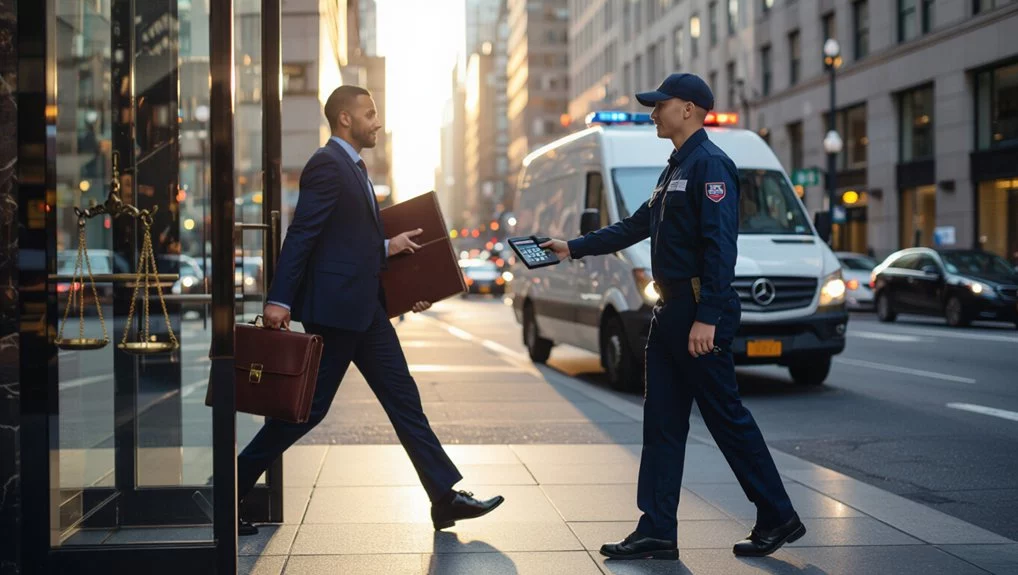You know what nobody warns you about when you start practising law? How much of your job is basically… moving paper. Not typing it, not filing it, but physically getting it from point A to point B. And not just any paper. We’re talking about documents that could decide whether someone keeps their home, their kids, or their whole future intact.
The Physical Evidence Problem
Here’s the strange thing about the legal world. Even in 2025, courts still cling to originals. They don’t want a neat little PDF, no matter how high-res. They want the crumpled, slightly coffee-stained paper with ink you can smudge with your finger. Why? Because originals can be tested, poked, sniffed for authenticity. You can run the ink, check the paper fibres, spot if someone tried to be clever with alterations.
A colleague told me recently about a “lost” will that magically appeared right before trial. On paper it looked fine. But the actual sheet, under a microscope, told a different story. Fresh ink, modern stock, all dressed up as five years old. That kind of forensic unmasking only happens when you’ve got the real thing in hand. And getting that piece of paper safely from an expert’s desk to a courtroom? That’s where a legal document carrier earns every penny.
Chain of Custody Isn’t Just for Crime Dramas
Everyone thinks “chain of custody” and imagines DNA swabs or bloody knives in evidence bags. But the same principle shows up in civil cases too.
Take intellectual property battles. Say you’re accusing someone of pinching trade secrets. You’ll need to show exactly how those sensitive documents moved from your client’s locked cabinet to the judge’s bench. Any gaps, even a short one, and the other side will scream tampering. If you’ve chucked it in the regular post, well… good luck explaining where it was for those missing 72 hours.
The Human Element (And Why Email Doesn’t Always Cut It)
Yes, we live in a digital world. Everything can be scanned, encrypted, signed online. But when you’re sitting with a client about to hand over their life savings, or an elderly person updating a will, sometimes they need something less clinical. They need to see a real person take the papers and walk out the door with them.
I’ve literally seen clients follow their documents all the way to reception, watching like hawks as the courier tucks them under an arm. It’s half psychological, half superstition. But it matters. And when someone’s entire peace of mind depends on a stack of papers, you don’t dismiss that.
Jurisdiction Hopping and Multi-Party Chaos
Now picture this: you’ve got three signatures needed in three different cities, all in the same day. It’s like trying to organise a school trip with a bunch of overgrown teenagers in suits.
For example:
- Seller in London, deadline at noon
- Buyer in Manchester, only free after 3
- Closing in Birmingham at 5 sharp
Post it? Forget it. You’d spend a week bouncing documents around with overnight delays stacking up like unpaid parking fines. With Drift Couriers, one person completes the delivery all in 1 day. Cheaper, faster, and far less painful than explaining to your client why their deal is slipping through the cracks.
When Confidentiality Really, Really Matters
There are papers you just don’t trust to a post box. Merger contracts that could wobble stock prices if leaked. Divorce petitions involving people the tabloids would eat alive. Whistleblower reports that could end careers overnight.
These aren’t “drop and run” jobs. They need someone discreet, someone who gets that leaving an envelope on a doorstep could change the outcome of a case—or a life. Couriers become less about transport and more about trust.
The Backup Plan Nobody Talks About
Here’s the dirty truth: lawyers mess up. Forget a signature, realise a form was missing a witness, clock the mistake late in the afternoon. It happens. More than anyone cares to admit.
That’s why keeping a same-day courier on call isn’t weakness. It’s survival. Like keeping a fire extinguisher in the kitchen—you hope you never need it, but the day flames are shooting out of your oven, you’re grateful it’s there. And in law, those little fires spark up all the time.

















